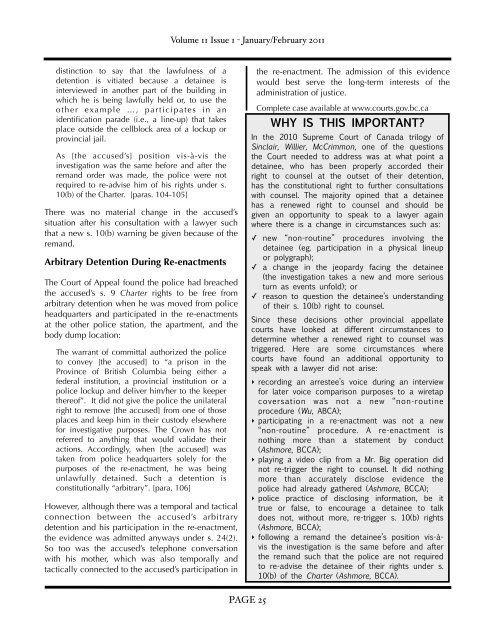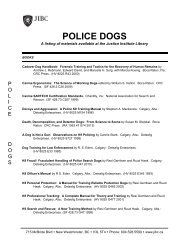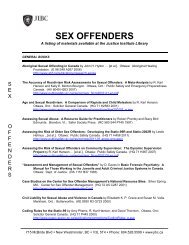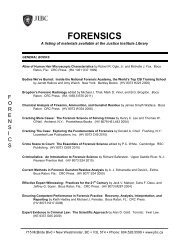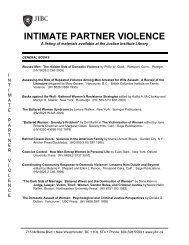legally speaking - Justice Institute of British Columbia
legally speaking - Justice Institute of British Columbia
legally speaking - Justice Institute of British Columbia
Create successful ePaper yourself
Turn your PDF publications into a flip-book with our unique Google optimized e-Paper software.
distinction to say that the lawfulness <strong>of</strong> a<br />
detention is vitiated because a detainee is<br />
interviewed in another part <strong>of</strong> the building in<br />
which he is being lawfully held or, to use the<br />
other example …, participates in an<br />
identification parade (i.e., a line-up) that takes<br />
place outside the cellblock area <strong>of</strong> a lockup or<br />
provincial jail.<br />
As [the accused’s] position vis-à-vis the<br />
investigation was the same before and after the<br />
remand order was made, the police were not<br />
required to re-advise him <strong>of</strong> his rights under s.<br />
10(b) <strong>of</strong> the Charter. [paras. 104-105]<br />
There was no material change in the accused’s<br />
situation after his consultation with a lawyer such<br />
that a new s. 10(b) warning be given because <strong>of</strong> the<br />
remand.<br />
Arbitrary Detention During Re-enactments<br />
The Court <strong>of</strong> Appeal found the police had breached<br />
the accused’s s. 9 Charter rights to be free from<br />
arbitrary detention when he was moved from police<br />
headquarters and participated in the re-enactments<br />
at the other police station, the apartment, and the<br />
body dump location:<br />
The warrant <strong>of</strong> committal authorized the police<br />
to convey [the accused] to “a prison in the<br />
Province <strong>of</strong> <strong>British</strong> <strong>Columbia</strong> being either a<br />
federal institution, a provincial institution or a<br />
police lockup and deliver him/her to the keeper<br />
there<strong>of</strong>”. It did not give the police the unilateral<br />
right to remove [the accused] from one <strong>of</strong> those<br />
places and keep him in their custody elsewhere<br />
for investigative purposes. The Crown has not<br />
referred to anything that would validate their<br />
actions. Accordingly, when [the accused] was<br />
taken from police headquarters solely for the<br />
purposes <strong>of</strong> the re-enactment, he was being<br />
unlawfully detained. Such a detention is<br />
constitutionally “arbitrary”. [para. 106]<br />
However, although there was a temporal and tactical<br />
connection between the accused’s arbitrary<br />
detention and his participation in the re-enactment,<br />
the evidence was admitted anyways under s. 24(2).<br />
So too was the accused’s telephone conversation<br />
with his mother, which was also temporally and<br />
tactically connected to the accused’s participation in<br />
Volume 11 Issue 1 - January/February 2011<br />
PAGE 25<br />
the re-enactment. The admission <strong>of</strong> this evidence<br />
would best serve the long-term interests <strong>of</strong> the<br />
administration <strong>of</strong> justice.<br />
Complete case available at www.courts.gov.bc.ca<br />
WHY IS THIS IMPORTANT?<br />
In the 2010 Supreme Court <strong>of</strong> Canada trilogy <strong>of</strong><br />
Sinclair, Willier, McCrimmon, one <strong>of</strong> the questions<br />
the Court needed to address was at what point a<br />
detainee, who has been properly accorded their<br />
right to counsel at the outset <strong>of</strong> their detention,<br />
has the constitutional right to further consultations<br />
with counsel. The majority opined that a detainee<br />
has a renewed right to counsel and should be<br />
given an opportunity to speak to a lawyer again<br />
where there is a change in circumstances such as:<br />
✓ new “non-routine” procedures involving the<br />
detainee (eg. participation in a physical lineup<br />
or polygraph);<br />
✓ a change in the jeopardy facing the detainee<br />
(the investigation takes a new and more serious<br />
turn as events unfold); or<br />
✓ reason to question the detainee’s understanding<br />
<strong>of</strong> their s. 10(b) right to counsel.<br />
Since these decisions other provincial appellate<br />
courts have looked at different circumstances to<br />
determine whether a renewed right to counsel was<br />
triggered. Here are some circumstances where<br />
courts have found an additional opportunity to<br />
speak with a lawyer did not arise:<br />
‣ recording an arrestee’s voice during an interview<br />
for later voice comparison purposes to a wiretap<br />
coversation was not a new “non-routine<br />
procedure (Wu, ABCA);<br />
‣ participating in a re-enactment was not a new<br />
“non-routine” procedure. A re-enactment is<br />
nothing more than a statement by conduct<br />
(Ashmore, BCCA);<br />
‣ playing a video clip from a Mr. Big operation did<br />
not re-trigger the right to counsel. It did nothing<br />
more than accurately disclose evidence the<br />
police had already gathered (Ashmore, BCCA);<br />
‣ police practice <strong>of</strong> disclosing information, be it<br />
true or false, to encourage a detainee to talk<br />
does not, without more, re-trigger s. 10(b) rights<br />
(Ashmore, BCCA);<br />
‣ following a remand the detainee’s position vis-àvis<br />
the investigation is the same before and after<br />
the remand such that the police are not required<br />
to re-advise the detainee <strong>of</strong> their rights under s.<br />
10(b) <strong>of</strong> the Charter (Ashmore, BCCA).


